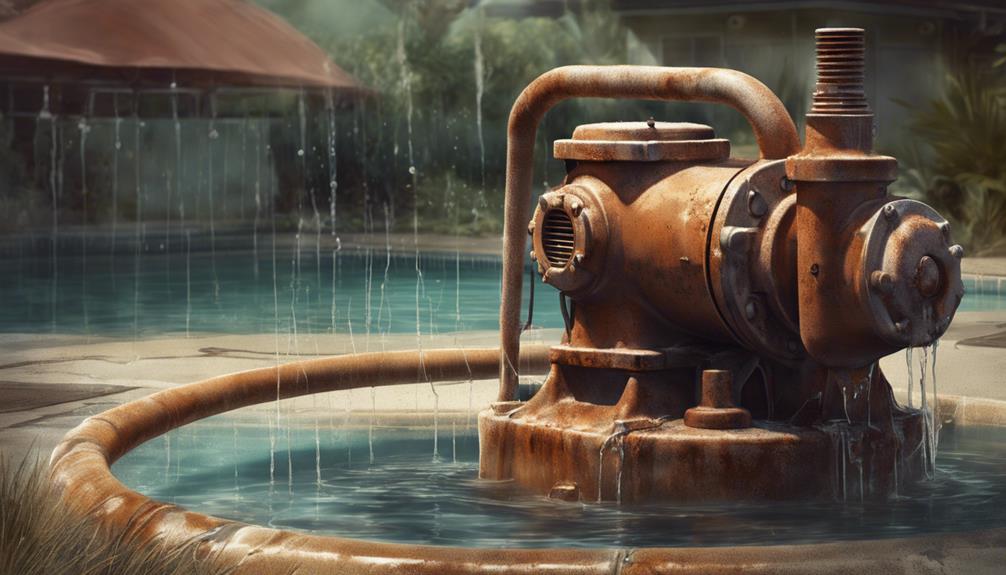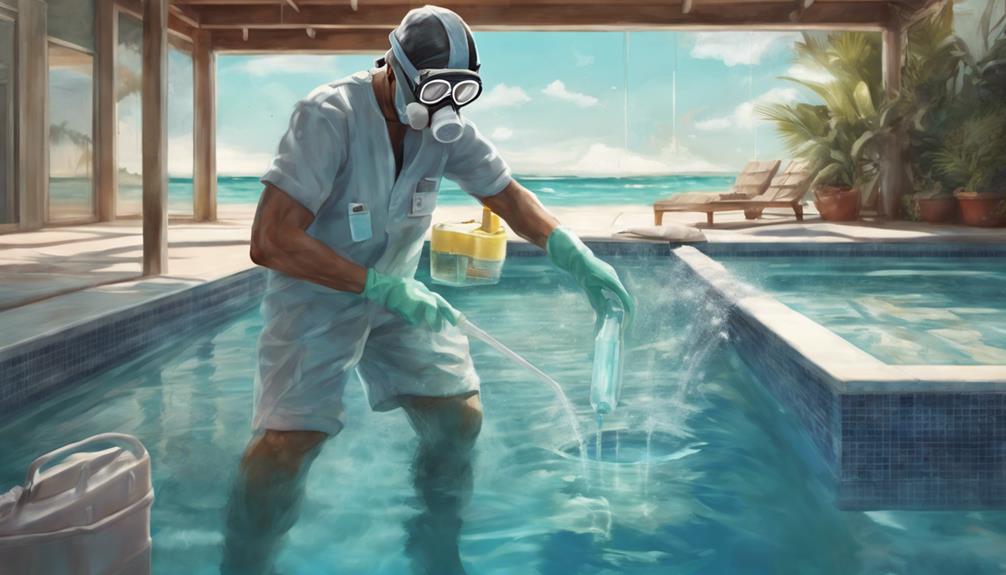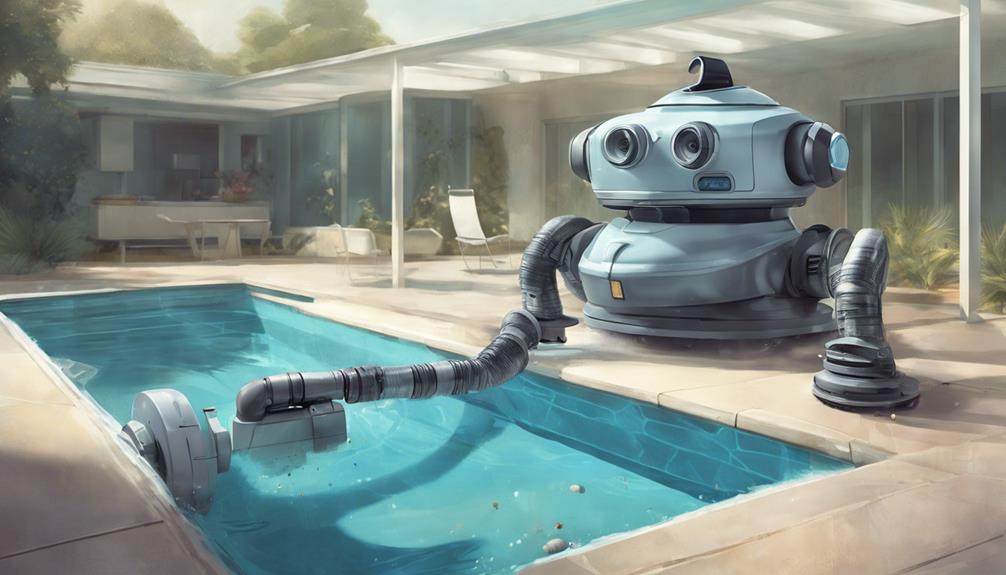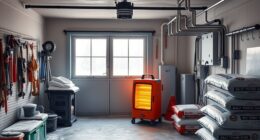When encountering issues with your pool pump such as leaks, reduced performance, and high energy consumption, it may be time to consider replacing the pump. Be on the lookout for signs like unusual noises, decreased effectiveness, and wear and tear due to age. It is crucial to promptly address any pump leaks by either tightening fittings or seeking assistance from a professional. Regular maintenance is key in prolonging the pump’s lifespan, improving performance, and avoiding expensive repairs. Factors such as noise levels, age, and maintenance habits should be taken into consideration to ensure that your pool pump operates efficiently. Understanding these factors will help you make well-informed decisions regarding the replacement of your pool pump.
Key Takeaways
- Pool pump leaks, decreased performance, increased energy consumption, and age nearing 12 years indicate replacement.
- Address strange noises promptly to prevent further damage and maintain pump efficiency.
- Deal with pump leaks by tightening fittings, repairing water leaks, and seeking professional help for complex issues.
- Recognize the impact of age on pump functionality and seek professional advice for accurate diagnosis.
- Regular maintenance extends pump lifespan, improves performance, reduces energy consumption, and prevents costly repairs.
Signs of Pool Pump Replacement
When considering pool pump replacement, it is crucial to recognize the distinct signs indicating the necessity for a new pump. Unmanageable or constant pump leaks are a clear indication that the pump may need replacement.
Additionally, an old pump nearing the end of its lifespan, typically around 12 years, may exhibit decreased performance, such as lagging startup or an overheating motor. Increased energy consumption is another sign that the pump is not functioning at its best.
Strange Noises and Their Implications
Identification of distinctive sounds emerging from your pool pump can provide valuable insights into potential issues impacting its operation and efficiency. When unusual noises are present, it is important to address them promptly to prevent further damage.
Here are some implications of these noises:
- Anxiety: Hearing irregular noises can cause worry about possible water level issues.
- Frustration: Vibrations from filter malfunctions can be irritating and disruptive to the pool environment.
- Concern: Identifying the source of the noise can be worrying, prompting the need for professional advice and intervention to guarantee the pump's longevity and performance.
Dealing With Pump Leaks Effectively

Efficiently addressing pump leaks is important for maintaining the integrity and functionality of your pool system. When dealing with pump leaks, it is vital to act promptly to prevent further damage. Here are common types of pump leaks and how to handle them effectively:
| Type of Pump Leak | Action Required |
|---|---|
| Loose pump lids or valves | Tighten fittings or replace seals |
| Water leaks | Identify source and repair promptly |
| Side suction or shaft seal leaks | Seek professional assistance |
| Cracked pump housing | Replace housing or consult expert |
| Corroded pump parts | Replace affected components |
Recognizing the Age Factor
Understanding the pivotal role of age in evaluating pool pump performance is fundamental for proactive maintenance and timely replacements. As pool pumps age, their efficiency and reliability may decline, leading to potential issues that can impact the overall functionality of the pool system.
To recognize the age factor effectively, consider the following:
- Pump Lifespan: Pool pumps typically have a lifespan of up to 12 years.
- Signs of Deterioration: Look out for lagging startup, overheating motors, and defective bearings.
- Professional Consultation: Seeking advice from a pool expert can help diagnose pump issues accurately and determine if a replacement is necessary.
Importance of Regular Maintenance

Regular maintenance of pool pumps is important for guaranteeing best performance and prolonging their lifespan. By implementing a consistent maintenance schedule, pool owners can prevent costly repairs and guarantee their pool pump operates efficiently. Here is a breakdown of why regular maintenance is essential:
| Benefits of Regular Maintenance |
|---|
| 1. Extends pump lifespan |
| 2. Improves pump performance |
| 3. Reduces energy consumption |
Regularly servicing pool pumps not only saves money in the long run but also maintains a safe and enjoyable swimming environment. Trusting professional pool technicians for regular maintenance can help identify and address issues before they escalate, ultimately maximizing the pump's longevity.
Frequently Asked Questions
Can I Replace My Pool Pump on My Own?
Replacing a pool pump independently requires technical expertise. Factors like electrical connections and plumbing must be considered. Professional assistance is recommended for safety and efficiency to guarantee proper installation and peak pump performance.
Are Energy-Efficient Pumps Worth the Investment?
Investing in energy-efficient pumps symbolizes a commitment to sustainability. They optimize pool operation, reduce energy costs, and promote environmental stewardship. Upgrading guarantees long-term savings and aligns with modern trends for eco-conscious pool ownership.
How Often Should I Clean My Pool Pump?
Regular cleaning of your pool pump is recommended at least every 3 months to maintain peak performance. However, factors like pool usage and environmental conditions may require more frequent cleaning. Consult a pool maintenance professional for personalized advice.
What Are the Benefits of Variable-Speed Pumps?
Variable-speed pumps offer numerous benefits, including energy efficiency, quieter operation, and customizable flow rates. They help reduce energy costs and provide better filtration, circulation, and heating for pools. Upgrading to a variable-speed pump can enhance overall pool performance.
Can a Pool Pump Upgrade Increase My Property Value?
Upgrading your pool pump can increase property value by enhancing energy efficiency, water circulation, and overall aesthetic appeal. Professional installation and maintenance guarantee peak performance, attracting potential buyers with a well-maintained pool system.
Is Pool Pump Failure Commonly Caused by Pool Leaks?
Pool pump failure can be commonly caused by pool leaks. When a pool is leaking, the pump has to work harder to maintain the desired water level, putting it under more stress and increasing the likelihood of failure. Proper pool leak repair techniques can help prevent this issue and keep your pump running smoothly.
Conclusion
By examining the warning signs and understanding the importance of proactive maintenance in pool pump replacement, it becomes evident that addressing issues promptly can prevent further damage and extend the lifespan of pool equipment.
The theory that regular maintenance and timely replacement of pool pumps can enhance system performance and prevent costly repairs is indeed true, emphasizing the critical role of professional expertise in maintaining an efficient pool system.










